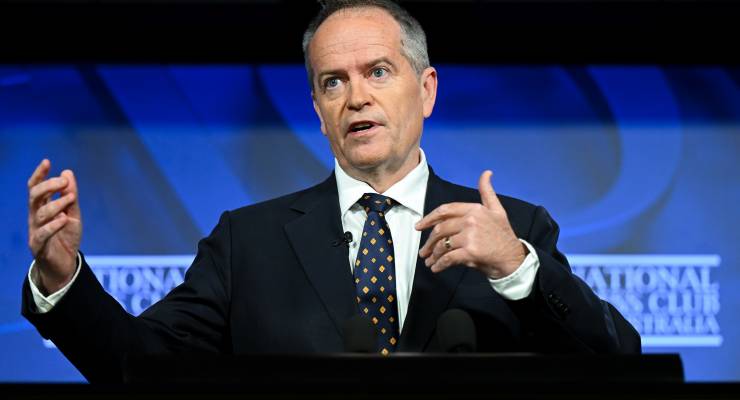
The National Press Club speech yesterday from National Disability Insurance Scheme Minister Bill Shorten was light on detail but firm on rhetoric about the scheme’s future.
The speech in part responded to recent pressure to cut life-saving support from disabled people — pressure from his own colleagues, from the conservative media’s disinformation campaign, and from the federal opposition.
Shorten started by talking about how he first learnt how disabled people and their families are excluded from the Australian community, a topic he has returned to many times over the years. He mentioned 2012’s Shut Out report, reminding the audience what life was like before the NDIS for people with disability.
He went on to outline his six-point plan for systemic reform of the NDIS and made a small announcement that the National Disability Insurance Agency (NDIA) would fund a pilot program in WA with Telethon Kids to see if early intervention for children with autism would improve outcomes and reduce costs.
The first item on Shorten’s agenda was improving and fixing the NDIA, “getting the culture right to stop the staff churn”. He cited a recent interim inquiry report from the Joint Standing Committee on the NDIS, which heard “stories of pain, fear, anxiety, frustration and exhaustion experienced by so many participants, families, carers and advocates in their journeys with the NDIS”.
Next is a long-overdue implementation of longer-term plans. People with disabilities have support for only a year or less, having to reapprove their disability annually, often with rounds of expensive reports paid for out of their support package. There is an IT trial underway in Tasmania that will hopefully help this change, as the NDIA’s ancient computer system is part of the reason plans must be reviewed every year.
Shorten’s third idea was to “address spiralling costs”. Supports must be “reasonable and necessary”, as some disability providers overcharge for goods and services. Shorten said the NDIS was not “fair game for the doubling or tripling of prices” and that people with disability are “valued clients, not ATMs”.
There was no more detail about how this would happen. There was no mention of a serious market regulation mechanism to stop the price gouging or the urgent need for an independent, strong consumer body.
The fourth item was another review of supported independent living (SIL). This is funding mostly used to support people with disability who live in group homes, and is the biggest expense in the NDIS, running at nearly $10 billion a year to support nearly 30,000 people.
The NDIS Quality and Safeguards Commission’s recent Own Motion report found that group homes could be awful places to live, with disabled people being repeatedly hurt by workers and others they live with. Disabled people have told the disability royal commission they have little say over their lives, with service providers deciding what they eat, when they go to bed, who they see, and what they do each day.
People with disability end up “captured” by a single service provider that owns the house they live in, employs the workers they use for support, runs the day program they go to, and controls every aspect of their lives. Increasingly people with disability do not want to live in group homes — but there is often little choice for those who need substantial support.
A review is fine, but what is needed is for the NDIS to fund more — and better — housing options. Its home and living policy is overdue and it’s hoped will bring some clarity to this out-of-date model of housing for disabled people, particularly by finally separating housing and supports so that the same disability service provider cannot do both.
Fifth on Shorten’s list was to target the misuse of NDIS funds, including unethical practices, with renewed focus on evidence and data. Again there was little detail provided, but the NDIS does fund programs, such as employment training, whose benefits aren’t based in evidence and which don’t work to get people with disability into a job. Whether this is what he meant isn’t clear.
The final piece in this reform agenda is the need for supports to exist outside the NDIS so disabled people can get fair access to mainstream public services.
This last item points to what much of the noise and fury surrounding the NDIS. The NDIS’ funding agreements with the states and territories are being renegotiated, determining which level of government pays for what. It is a chance for the Commonwealth to put pressure on states and territories to get serious about including disabled people in services such as health, education and transport.
For example, there’s been a lot of fuss about the fact that 10% of boys and 4% of girls aged five to seven are getting individualised support through the NDIS. This seems like a lot, and it is, but the individual amounts aren’t high. What it does point to is a problem with how disabled kids are faring when they start school. What are the state and territory education systems doing about this? And how is this going to be worked out in funding discussions?
Shorten spoke of the need for supports outside the NDIS — for the NDIS to not be the only game in town. And he is right, but getting the states and territories to deliver those supports isn’t going to be easy. What will be the result of nearly all the states and territories now having a Labor government?
This reform blueprint Shorten laid out didn’t say anything unexpected or unknown to disabled people, many of whom are busy with the NDIS review looking in detail at how to make the scheme work better, with a report due in October. The disability royal commission also has its final report due in September and will make recommendations about the NDIS.
At the end of his speech, Shorten said: “There is nothing I will ever do that is more important than securing the future of the NDIS.” What that will look like by the end of this year is still unclear.








Trying to cut the cost, yet in the first place they excluded truly disabled people over 65. Of course the privatisation of what should be a social service doubles the cost and halves the service while the rent- seekers bathe in untold wealth..
I watched the whole speech and the long Question & Answer session afterwards. I thought this speech laid out an agenda that was refreshing and comprehensive. Of course it was light on details, that wasn’t the aim. Further it showed a man who is across his brief and passionate about achieving much needed reform. It also demonstrates what can be learned by an individual from defeat in the way of humility and renewed sense of purpose. Of course let’s wait for the review and then see how implementing the agenda goes, but this speech was a good start.
Two quick ways to shave billions off the NDIS budget.
One, remove the need to use NDIS accredited providers. They charge double the going rate for services, ie, OTs can charge 200 an hour for filling in an application form, physios the same, builders double sometimes triple quotes when they know it’s a NDIS modification. It’s a trough with many greedy snouts in. What their accreditation provides is a mystery and seems only a licence to print money.
Two sort out the most expensive cost,ie independent housing which is upwards of 130,000 a year per person.
Three get tough on reasonable and necessary. It has fit those two rigorous guidelines. Lots of waste in this system and a serious cost cutting audit would save billions.
I was listening to some examples of extortion three days ago. A man needed a special bed costing $6,000 but his relative found the same bed only cost $2,000 from a bed shop. NDIS refused to buy the cheaper bed because it did not come from an NDIS endorsed supplier. This sort of stuff is rampant as you point out. This is the sort of nuts and bolt issue Shorten has to tackle as well his other ideas.
And the good news is that he has clearly stated he is coming to get these crooks. He went on to say if your business model is based on ripping off the NDIS then look for another job. I’ll wait to see if he’s good to his word.
The difficulty isn’t the strategic good intention, Salty Bob, it’s the grass roots implementation. The only way to mitigate rorting and gouging and waste is by saying ‘no’ to people, and their providers, who will naturally seek to maximise the resources allocated to them. This is now almost impossible to do, structurally, functionally and especially ‘societally’. The problem is the deep guilt that suffuses our influential Knowledge Class’s approach to ‘care’ issues.
Bluntly…no-one wants to end up having to help wipe arses themselves. So we all desperately ‘out-source’ our compassion. We ‘over-resource’ (but under-triage and under-supervise) the actual applied care, and especially its administrative heirachies and chains-of-(what-should-be)-accountable-management. We over-‘professionalise’ and over-‘credential’ daily care work, we fetishise and sentimentalise and concescend the sh*t out of the actual carers – even as we pay that very bottom rung of that system, which is where the care action is, relative cr*p.
And this ruinously unsustainable structure becomes a ‘proxy’ for the expression of our ‘compassion’. We are handing control of a Care Sector ATM to the unscrupulous, the lazy and the dishonest…and deluding ourselves that if we just articulate a vague, feelgood approval of the ‘good intentions’ of the NDIS, that is a ‘good enough’ way of showing how much we, too, care.
We need more people actively helping to care for the disabled, not a better ‘system’ for doing so. This means you Crikerians, too. Fewer hand-wringing articles, more hands on deck in the care sector and in the homes.
Again, my universal Care Sector National Service citizenly obligation concept is the only way this is ever going to work. It’s not just about resourcing. It’s also about re-creating a sustainable national collective sentiment and ethos, regarding caring for those in our tribe who need it.
This is what Shorten has been saying – the people on the NDIS scheme, have become, to providers, cash cows.
“Light on detail” and that’s when I stopped reading, it has become the catchcry of so many opinion pieces, and those Liberals too lazy to read the detail when it’s put before them, that it’s become pointless to bother reading further. How much detail do you want before an inquiry has even started?
Apart from that, the last time Mr Shorten gave out the details it gave Morrison the election, and what a duck’s breakfast that became forcall of us.
Yep. Me too. I listened to Shorten’s press club speech yesterday and to interviews last night. He was very clear about needed fixing but careful not to pre-empt the inquiry and its findings and recommendations.
I am now quite over so many articles listing what has NOT been done by this, that or the other organisation in the last six, twelve, eighteen months. Like the author of the article, above, on “template-led opinion pieces” I am quite weary of authors demanding quick answers to complex issues.
Providers should not be allowed to provide all things for any participant. If you’re in a group home run by X, your day programs should be run by Y, Z etc … there’s no reason everyone in a group home should be sent to same day activity. People should also be supported in other accommodation, just because one person has a disability, doesn’t mean everyone else in the house has to.